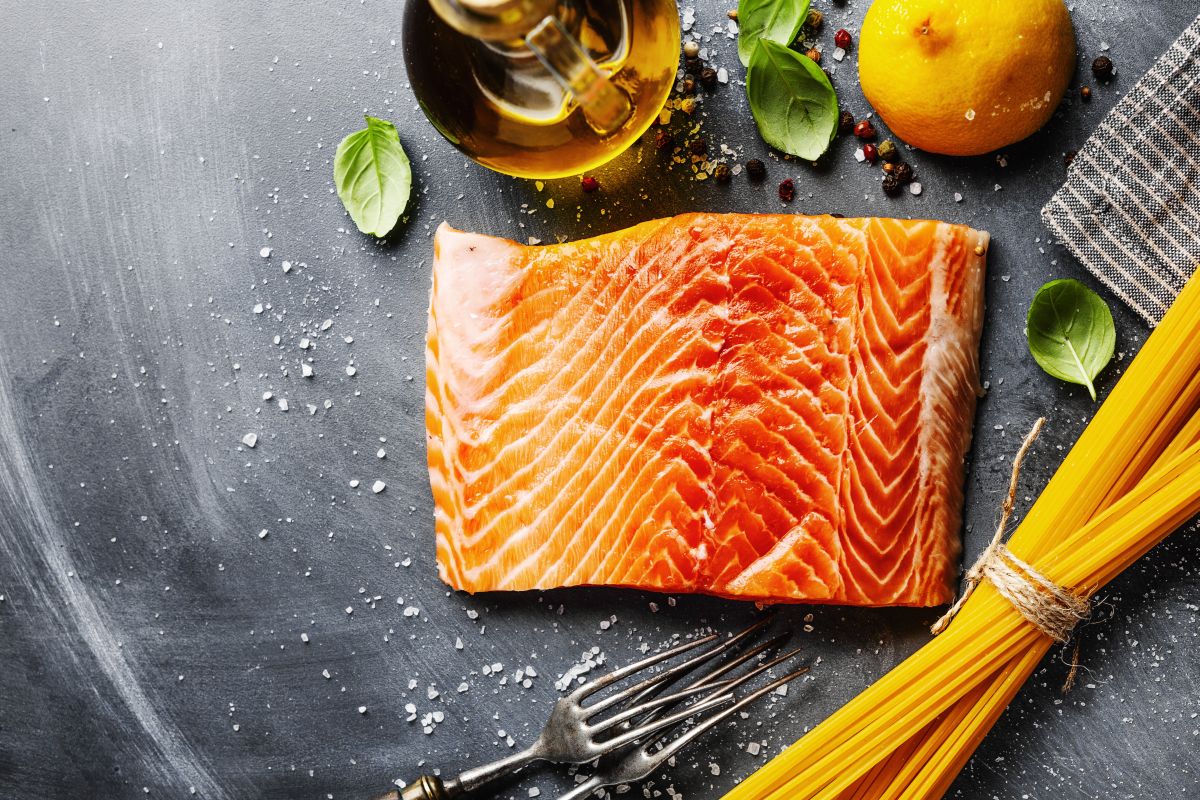If you’re on an NAFLD diet, then it’s very likely that you will instinctively want to avoid eating salmon. It is a fish that’s high in fats, so how could salmon possibly be good for a fatty liver, right?
Well, even though salmon meat has high amounts of fat, we will see in today’s article that it actually is a good choice for those suffering from a fatty liver.
So before you completely cross out salmon from your new diet, you should know that this fish isn’t at all bad for your liver’s health.
This is because not all fat is bad. The fat in salmon is healthy for your body – and this includes your liver. While it is not one of the superfoods recommended for the liver, it is still good as long as you eat it in moderation.
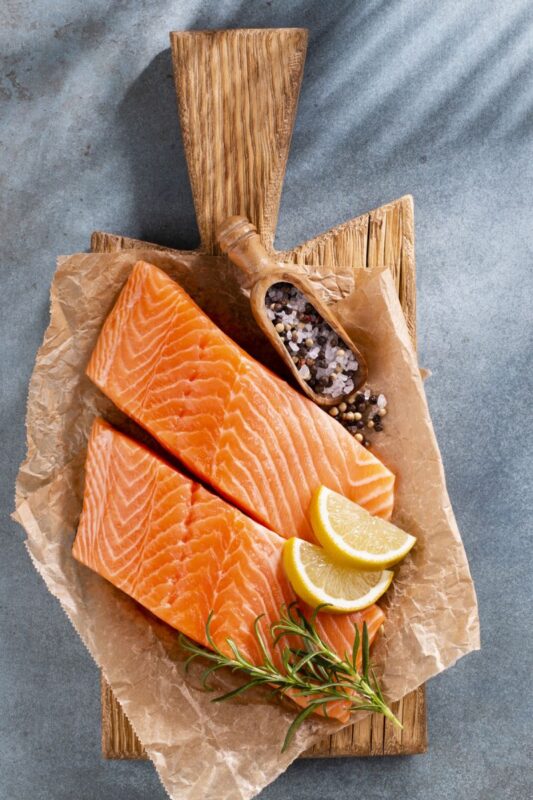
Unlike red meats such as pork and beef, salmon doesn’t contain huge amounts of saturated fats. On the contrary, salmon contains an abundance of Omega-3 fatty acids.
These are polyunsaturated fatty acids – better known as PUFAs. PUFAs are fats that are very good for your health.
Even more, the Omega-3 polyunsaturated fats are essential for our bodies – yet the human body can’t make them, so they have to come from the food we eat. You can read more about the healthy unsaturated fats on Harvard’s School of Public Health.
But the bottom line is that you shouldn’t exclude salmon (especially wild salmon) from your diet, even though it is high in fat. It has many benefits for our body, including the liver and NAFLD.
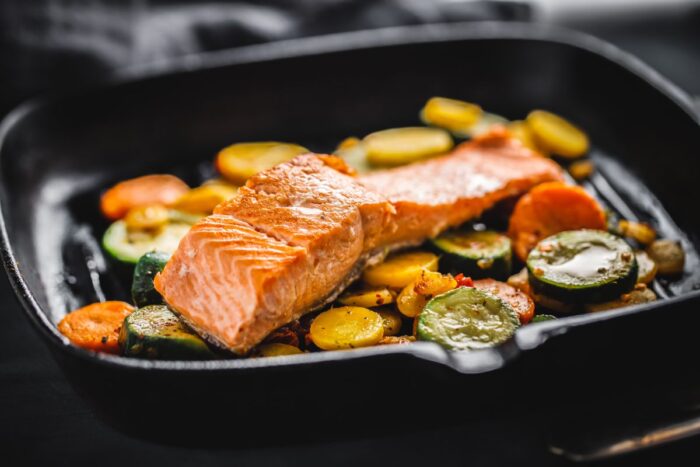
Why is salmon good for fatty liver?
Unlike whitefish which store most of their oil in their livers, salmon is an oily fish. What this means is that salmon stores oil mostly in its flesh and around its gut, not in its liver. Typically, a salmon fillet may contain up to 30% fat.
But unlike in most other cases, this high fat content shouldn’t scare you away from eating this delicious meat. Around 24% of the 30% fat content in salmon is the healthy Omega-3 fatty acids we have talked about earlier.
These fatty acids are good fats. Omega-3 fatty acids have a truckload of health benefits for liver health.
For one, these polyunsaturated fatty acids reduce the level of triglycerides (blood fats) in your body.
As the level of triglycerides circulating in your system increases, fat buildup in your liver also increases.
The omega-3 fatty acids present in salmon interrupt this process by reducing triglyceride levels in your blood. As a result, the accumulation of fat in your liver is also reduced.
How nice is that? Using fat to beat fat! This is why these unsaturated fats are usually called “healthy fats” and the saturated fats are the “unhealthy ones”.
Another method for burning fat faster is taking / drinking or simply adding more apple cider vinegar into your diet. I’m having it constantly and, just like most people who introduce it into their diets and suffer from a fatty liver, I see great results from that too.
But back to the saturated fats and triglycerides! In addition to being bad for your liver, a high triglyceride level is also bad for your cardiovascular system.
It can contribute to clogging up your arteries and put you at an increased risk of heart disease and stroke. A poor cardiovascular function can in turn have adverse effects on the health of your liver.
On the other hand, the unsaturated fats – like the Omega-3 fatty acids found in abundance in salmon mean will also increase the level of HDL cholesterol in the body.
HDL cholesterol is also known as good cholesterol. It protects the body by removing bad cholesterol from circulation, and as a result, reduces the accumulation of cholesterol deposits in the liver.
Omega-3 fatty acids also have anti-inflammatory properties which play a key role in preventing NAFLD from getting worse and could even help your fight to reverse it completely.
Your body’s sensitivity to insulin can also be increased by omega-3 fatty acids. There is a strong association between low insulin sensitivity – or insulin resistance – and NAFLD. With improved insulin sensitivity, you are most likely to experience an improvement where your fatty liver is concerned.
I personally consumed salmon about one time per week and managed to reverse my fatty liver. However, I do not attribute that to eating salmon alone – it was just part of my varied diet, backed up by some supplements I also took.
Does your NAFLD diet need salmon?
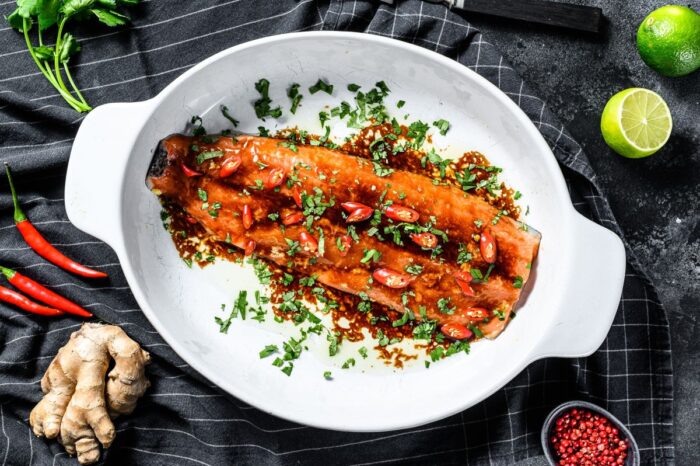
Omega-3 fatty acids are incredibly valuable to the health of your liver. Unfortunately, these fats aren’t produced in the body because of the absence of certain enzymes.
Because of this, your body has to obtain these nutrients from the food that you eat. So, it is necessary to include sources of omega-3 fatty acids as part of a healthy diet.
However, while salmon is a great, healthy source of polyunsaturated fatty acids, it isn’t your only option. There are other good sources of omega-3 fatty acids and other PUFAs.
These alternative sources include other oily fishes like anchovies, mackerel, sardines, tuna, herring, and trout. Other seafood such as shellfish and caviar are also rich in omega-3 fatty acids.
Some nuts and seeds are also good sources of omega-3 fatty acids. These include flaxseed, walnuts, and chia seeds. Plant oils such as canola oil, flaxseed oil, and soybean oil.
So if you decide to go vegan or vegetarian in your quest to reverse fatty liver, you still have options. But otherwise, salmon is a great addition to your diet.
It does matter what type of salmon you are eating, though. It is considered best to eat wild-caught Salmon and not the farmed variety. Usually, the Pacific salmon is wild-caught, while Atlantic salmon is farmed.
Is canned salmon good for fatty liver?
I’m happy to tell you that canned salmon is just as nutritious as fresh salmon. Just like fresh salmon, canned salmon is also good for fatty liver.
The canning process preserves the nutrients in the fish so it contains the same amount of protein as well as those amazing omega-3 fatty acids that are so good for your liver health. Canned salmon offers the same health benefits as its fresh counterpart.
Canned salmon tends to be a more convenient option when compared to fresh fish. It is already precooked which makes it easier and quicker to prepare.
So, if you’re not much of a chef or you just don’t have the time, you can still incorporate salmon into your diet by using canned salmon.
When buying canned salmon, check the labels to make sure the packaging is BPA-free. BPA, Bisphenol-A, is an industrial chemical that is added to some commercial products such as plastic food containers, water bottles, etc.
It is best to avoid salmon canned in BPA-containing cans because this chemical is potentially harmful to health.
Also, as mentioned before, look to buy wild-caught salmon and not farmed one as the latter is considered less healthy. You can read more on this matter here.
Conclusion
Although salmon is an oily fish, its high fat content is nothing to be worried about. On the contrary, the fats contained in salmon make it a very good fish for fatty liver.
Salmon contains good fats known as omega-3 fatty acids. These fatty acids help reduce the buildup of fats in the liver. They also help reduce inflammation and increase insulin sensitivity.
Your body doesn’t produce these omega-3 fatty acids, which means you need to add them to your diet from external sources, such as fish.
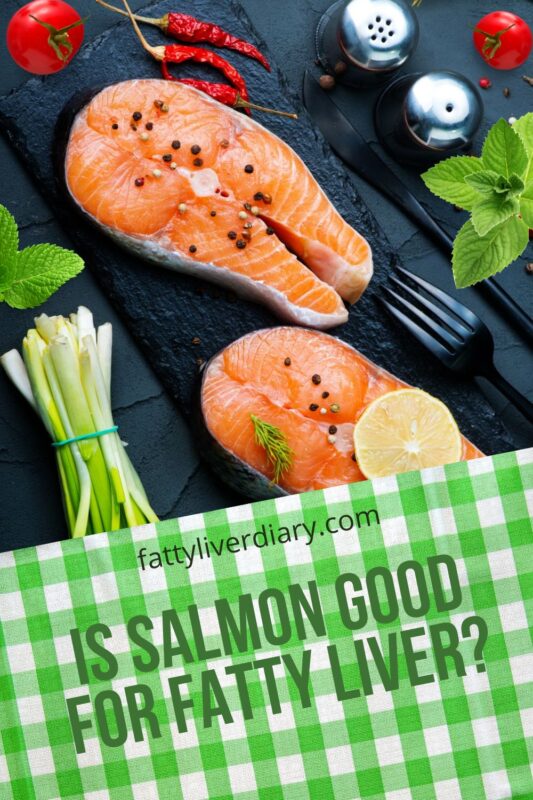
While salmon isn’t the only source of omega-3 fatty acids, it is one of the best sources out there.
However, other great sources include other fish like tuna and mackerel, nuts like walnuts, and plant oils (which can still be used even if you decide to cook without oil).
If you have any questions or additional comments, I’d love to read them. Please write them down in the comment section below.

I was diagnosed with a fatty liver back in 2014 and managed to reverse it by mid-2015. Since then, I’ve been studying it, continuously updating my knowledge with the latest scientific findings and practical approaches to give others the help they need to reverse their condition.
My approach to managing fatty liver is holistic, balancing scientifically-backed information with real-life, practical advice based on personal, direct experience.
I am also the admin of the Fatty Liver Support Group on Facebook and the Fatty Liver Subreddit.

